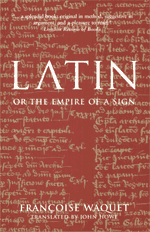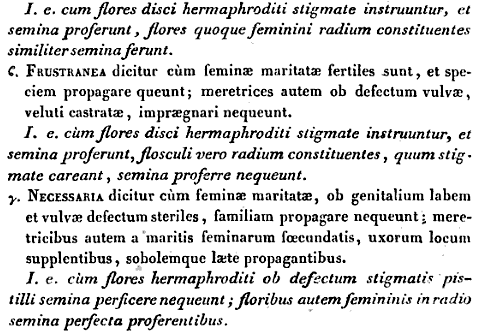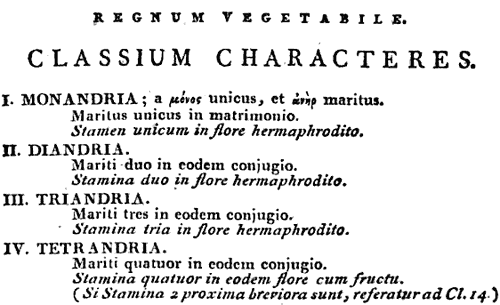![Calyx imbricatus, polyphyllus: foliolis interioribus majoribus. Lorem ipsum dolor sit amet.... [Sorry, just kidding!] Camellia Japonica. Rose Camellia.](https://pinyin.info/news/news_photos/2012/01/camellia_japonica.jpg) As of the beginning of this year, the International Code of Botanical Nomenclature no longer compels botanists to write descriptions of new species in Latin. Instead, they can opt for English, though the names of the species themselves will still be given in Latin.
As of the beginning of this year, the International Code of Botanical Nomenclature no longer compels botanists to write descriptions of new species in Latin. Instead, they can opt for English, though the names of the species themselves will still be given in Latin.
As James S. Miller, dean and vice president for science at the New York Botanical Garden, noted in the New York Times earlier this week:
No longer will botanists have to write sentences like: “Arbor usque ad 6 m alta. Folia decidua; lamina oblanceolata vel elliptica-oblongata, 2-7 cm longa,” as I did in 2009, describing a new species from Mexico. Instead, I could simply write that Bourreria motaguensis was a six-meter-tall tree with deciduous leaves that were 2 to 7 centimeters long.
The change “will help to speed up the race to catalog the world’s plant life,” he added.
Elsewhere, plant biologist Jerrold Davis of Cornell University was quoted as saying that he did not think the permitted switch to English would speed things up. Nevertheless, he called the move an “overdue modernization.”
Mark Watson, of Edinburgh’s Royal Botanic Garden and secretary of the International Botanical Congress’ special committee on electronic publication, expressed the same sentiment, saying of the move away from Latin, “About time too,” adding that translation into Latin is not necessarily an easy task for researchers in countries such as China.
Davis noted, “The removal of the Latin requirement is an acceptance that English has become the language of science, and Latin has become an encumbrance rather than a facilitator of communication” [emphasis added].
Even if it does not accelerate the publishing process, the end of the Latin requirement may allow for greater inclusion of scientists from countries where education rarely includes instruction in classical languages. According to Sandra Knapp, a botanist with the Natural History Museum in London: “In places like Ethiopia, for example, people are finding it very difficult to write in Latin. But in reality everybody’s bad at it.” [emphasis added]
 In case you’re wondering why I’m writing about Latin and English on a blog that focuses mainly on Pinyin and Sinitic languages, I’m struck by the parallels between the position of Latin in the West (see Françoise Waquet’s terrific Latin, or, The Empire of a Sign: From the Sixteenth to the Twentieth Centuries) and (1) notions of Literary Sinitic (a.k.a. “classical Chinese”) in the Sinosphere and (2) beliefs in the efficacy of Chinese characters despite extensive problems with their near-exclusive use as a script for Mandarin. I’m pleased that scientists no longer are forced to follow a tradition that many found cumbersome and outdated.
In case you’re wondering why I’m writing about Latin and English on a blog that focuses mainly on Pinyin and Sinitic languages, I’m struck by the parallels between the position of Latin in the West (see Françoise Waquet’s terrific Latin, or, The Empire of a Sign: From the Sixteenth to the Twentieth Centuries) and (1) notions of Literary Sinitic (a.k.a. “classical Chinese”) in the Sinosphere and (2) beliefs in the efficacy of Chinese characters despite extensive problems with their near-exclusive use as a script for Mandarin. I’m pleased that scientists no longer are forced to follow a tradition that many found cumbersome and outdated.
Another noteworthy modernization in the world of scientific botany is that the International Code of Botanical Nomenclature now also recognizes publication in online academic journals as valid; print publication is no longer required.
Sources and further reading:
- Flora, Now in English, New York Times (op-ed), January 22, 2012
- Revised rules for botanical taxonomy take effect, Nature News Blog, January 9, 2012
- Botanists shred paperwork in taxonomy reforms, Nature, July 20, 2011
- Systema naturæ, by Carl Linnæus
Editions of Latin, or, The empire of a sign, by Françoise Waquet:
- French original: Le latin, ou, L’empire d’un signe: XVIe-XXe siècle
- Latin, or, The Empire of a Sign: From the Sixteenth to the Twentieth Centuries, translated into English by John Howe
- Latino. L’impero di un segno (XVI-XX secolo), translated into Italian by Alessandro Serra
- Lādīngwén Dìguó (拉丁文帝國), translated into Mandarin by Chén Qǐwén (陳綺文), Māotóuyīng Chūbǎnshè (Owl Publishing Co., Taiwan / 貓頭鷹出版社)



Oh no, they really did this? Up until now? And I thought only Taiwan would do something as smart as wenyanwen(esque) (technical) exams in the 21st century…
While I agree that this change was overdue (and I believe most researchers will agree too), I couldn’t help noticing that you are only quoting people who have English names. I wonder what an Italian botanist would say.
“English names”? This is about Latin… The plants are still named in Latin, but now people do not need to write the description in Latin…
Nothing about “English names”… So except an Italian botanist is really good in Latin he will probably be happy to hear this…
I don’t miss the latin inscriptions, but I find it a little bit sad that the only other choice is English now.
Of course, English is a scientific language blabla, but still it is a little bit sad. Would be nice if one could write in whatever language he pleases and then it would be translated in to several languages.